 The core message that Sen. Bernie Sanders (I-VT) delivered last month when he addressed Party leaders at the Summer Meeting of the Democratic National Committee entailed a lesson in electoral math, according to The Nation's John Nichols.
The core message that Sen. Bernie Sanders (I-VT) delivered last month when he addressed Party leaders at the Summer Meeting of the Democratic National Committee entailed a lesson in electoral math, according to The Nation's John Nichols.
"Democrats will not retain the White House, will not regain the Senate or the U.S. House, will not be successful in dozens of governor races across the country," Sanders observed, "unless we generate excitement and momentum to produce a huge voter turnout."
The "electoral math" to which both Sanders and Nichols refer is the math which, they argue, is achievable during the second stage of a Sanders-led, "political revolution". That would be a phase --- once Sanders was able to secure the Democratic Party nomination and prior to the November 2016 election --- in which it would be all but impossible for the corporate-owned media and Democratic Party establishment to conceal or evade Sanders' issue-based message. Even those members of the Democratic Party whose careers have been linked to monetary contributions from what Noam Chomsky describes as "the substantial people" would, at that point, be hard-pressed to stand in the way of the revolution's momentum.
But, for now, Sanders is in the midst of the far more difficult first stage --- one that requires overcoming the corporate-owned media's marginalization of his campaign. It also entails overcoming the exercise in self-protection by the Democratic Party establishment. Long before the first vote has been cast in either a caucus or primary, the Clinton campaign boasted that its backroom deals had already netted one-fifth of the delegates needed to secure the nomination from amongst the unelected super-delegates --- party leaders who do not have to abide by the will of the electorate in their respective states. Simultaneously Rep. Debbie Wasserman-Schultz (D-FL), the DNC chair and former co-chair of the Hillary Clinton 2008 campaign, has sought to blunt Sanders' attempt to eliminate the "democracy deficit" --- the significant gap between the policy positions of the electorate and their "representatives" occasioned by the manner in which elections are skillfully managed to avoid issues and marginalize the underlying population --- with her imposition of severe limits on the number and timing of the Democratic Party Presidential Debates.
Sanders has countered those maneuvers, somewhat, by relying instead upon alternative and social media, drawing huge crowds, growing an army of grass roots volunteers and, most importantly, offering both authenticity and substance in his campaign.
The results, to date, have been encouraging for the Vermont Senator. Just a few months ago, Clinton's leads in New Hampshire and Iowa appeared insurmountable. But now, as New Hampshire Public Radio noted recently, "The latest polls show Sanders leading Clinton by 22 points in New Hampshire and by 10 points in Iowa." Some who have examined polling trends, such as historian Eric Zuesse, have gone so far as to boldly predict Sanders will become the next President of the United States.
That's the current battle of phase one of the electoral math. More interesting, however, is the dynamics of what could become the second and third phases of a Sanders-led democratic revolution...
Phase Two
During a recent interview with CNN's Wolf Blitzer, Sanders, after acknowledging that he was "stunned" by the speed of his success to date, added: "We have a message that I believed from day one was going to resonate with the American people."
Sanders' belief that his message would "resonate" is grounded in statistics. As we reported in Bernie Sanders versus the 'Democracy Deficit':
Likewise, as we reported back in 2009 at the outset of the healthcare debate, despite corporate media's virtual blackout of the issue, a New York Times/CBS poll revealed that nearly 2/3 of all Americans at the time supported a single-payer, "Medicare for All" universal healthcare system. A more recent poll reveals that 72% of Americans regard the cost of prescribed medications as unreasonable (a poll which preceded the decision by 32-year-old hedge fund manager Martin Shkreli to put lives at risk by raising "the price of a crucial AIDS medication from $13.50 per pill to $750 per pill.")
In other words, Sanders is "stunned" by how swiftly he's pierced the MSM's electronic curtain, but he's not surprised that, once heard, his message appears to be resonating with the American people.
His hope is that those same numbers work to his advantage during phase two, the general election race, presuming he is able to secure the nomination.
Envisioning a Third Phase
As Sanders discussed in his speech at the DNC Summer Meeting, the target of what he describes as a "political revolution" is much broader than the Presidency. He seeks a radical transformation from our current oligarchy to a functional democracy. It would be a transformation that renders as meaningless the suggestion that Sanders' progressive agenda would be doomed to failure because it would never get past square one in a Republican-controlled Congress.
President Obama, Sanders asserts, made a huge mistake in seeking to negotiate with radical Republicans in Congress, who were committed to making him a one-term President. That negotiating process served only to squander the Democratic majorities then held in both Houses of Congress and to suppress the vote, to the point that 63% of the American people; 80% of young people, were so disillusioned that they didn't bother to even turn out for the 2014 midterm.
"Any serious President that wants to represent working families," Sanders proclaimed, "has to mobilize the people all over this country to make the Congress an offer they can't refuse."
Thus, the success of a Sanders-led revolution will not be measured by him securing the Democratic nomination, or even being elected to serve as President, but by the extent to which the 2016 election and its aftermath transforms our society.
That, of course, means that the electorate must remain ever vigilant and active after the election. But then, nobody ever said that a political revolution would be easy.


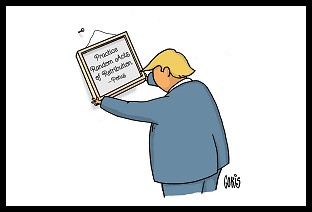 Sunday 'Random Acts of' Toons
Sunday 'Random Acts of' Toons From CA's 'Nuclear Deterrence' Map to Newsom's Trolling to Trump's 'Fascist Theatre' and Beyond: 'BradCast' 8/21/25
From CA's 'Nuclear Deterrence' Map to Newsom's Trolling to Trump's 'Fascist Theatre' and Beyond: 'BradCast' 8/21/25 'Green News Report' 8/21/25
'Green News Report' 8/21/25
 On 'Americanism' and Trump's 'Stalinesque' Plot to Whitewash U.S. History: 'BradCast' 8/20/25
On 'Americanism' and Trump's 'Stalinesque' Plot to Whitewash U.S. History: 'BradCast' 8/20/25  Texas GOP Imprisons Dem State Lawmaker in State House Chamber: 'BradCast' 8/19/25
Texas GOP Imprisons Dem State Lawmaker in State House Chamber: 'BradCast' 8/19/25 'Green News Report' 8/19/25
'Green News Report' 8/19/25 Trump, Nazis and
Trump, Nazis and 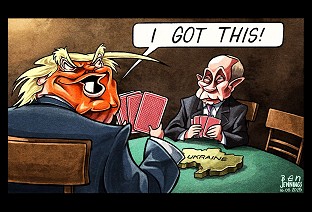 Sunday '
Sunday ' Newsom's 'Election Rigging Response Act'; FCC's License Renewal for Sock-Puppeting Sinclair: 'BradCast' 8/14/25
Newsom's 'Election Rigging Response Act'; FCC's License Renewal for Sock-Puppeting Sinclair: 'BradCast' 8/14/25 'Green News Report' 8/14/25
'Green News Report' 8/14/25 140 New House Reps?: Moving Beyond the Gerrymandering Wars: 'BradCast' 8/13/25
140 New House Reps?: Moving Beyond the Gerrymandering Wars: 'BradCast' 8/13/25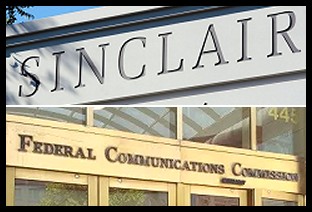 FCC Renews Sinclair TV Licenses Despite Complaint from Petitioner Who Died Waiting
FCC Renews Sinclair TV Licenses Despite Complaint from Petitioner Who Died Waiting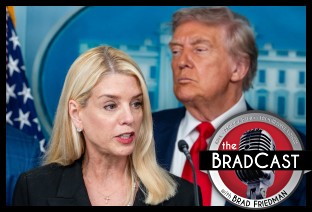 It's Not About the Rule of Law, It's About Authoritarian Control: 'BradCast' 8/12/25
It's Not About the Rule of Law, It's About Authoritarian Control: 'BradCast' 8/12/25 'Green News Report' 8/12/25
'Green News Report' 8/12/25 After Vaccine Cancels, CDC Shooting, Former Officials Want RFK Out: 'BradCast' 8/11/25
After Vaccine Cancels, CDC Shooting, Former Officials Want RFK Out: 'BradCast' 8/11/25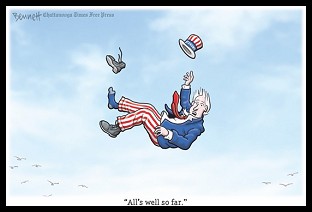 Sunday 'All's Well' Toons
Sunday 'All's Well' Toons 'Green News Report' 8/7/25
'Green News Report' 8/7/25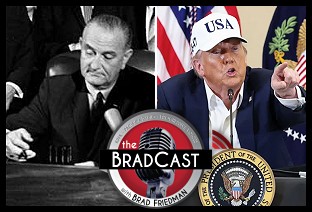 Trump Wars Against Greem Energy, Democracy on VRA's 60th: 'BradCast' 8/7
Trump Wars Against Greem Energy, Democracy on VRA's 60th: 'BradCast' 8/7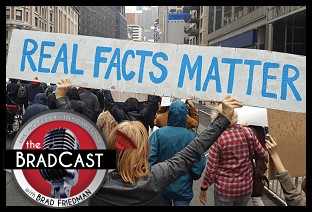 Media Conglomerates Continue Trump Capitulation: 'BradCast' 8/6/25
Media Conglomerates Continue Trump Capitulation: 'BradCast' 8/6/25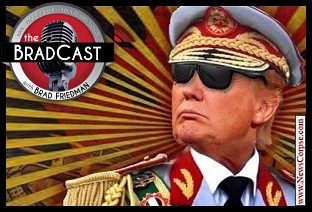 Banana Republican: Trump Shoots the Labor Statistics Messenger: 'BradCast' 8/5/25
Banana Republican: Trump Shoots the Labor Statistics Messenger: 'BradCast' 8/5/25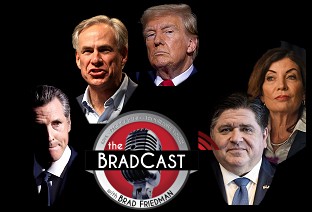 All's Fair in Love, War and, Apparently, Part-isan Gerrymandering: 'BradCast' 8/4/25
All's Fair in Love, War and, Apparently, Part-isan Gerrymandering: 'BradCast' 8/4/25 The Art of the Corrupt, Phony, Unlawful, Pretend Trade Deal: 'BradCast' 7/31/25
The Art of the Corrupt, Phony, Unlawful, Pretend Trade Deal: 'BradCast' 7/31/25 Battle Begins Against Trump EPA Climate Regulations 'Kill Shot': 'BradCast' 7/30/25
Battle Begins Against Trump EPA Climate Regulations 'Kill Shot': 'BradCast' 7/30/25 A Pu Pu Platter of Trump Corruption: 'BradCast' 7/29/25
A Pu Pu Platter of Trump Corruption: 'BradCast' 7/29/25 'Catastrophic' GOP Cuts to Medicaid, Medicare, ACA: 'BradCast' 7/28/25
'Catastrophic' GOP Cuts to Medicaid, Medicare, ACA: 'BradCast' 7/28/25
 VA GOP VOTER REG FRAUDSTER OFF HOOK
VA GOP VOTER REG FRAUDSTER OFF HOOK Criminal GOP Voter Registration Fraud Probe Expanding in VA
Criminal GOP Voter Registration Fraud Probe Expanding in VA DOJ PROBE SOUGHT AFTER VA ARREST
DOJ PROBE SOUGHT AFTER VA ARREST Arrest in VA: GOP Voter Reg Scandal Widens
Arrest in VA: GOP Voter Reg Scandal Widens ALL TOGETHER: ROVE, SPROUL, KOCHS, RNC
ALL TOGETHER: ROVE, SPROUL, KOCHS, RNC LATimes: RNC's 'Fired' Sproul Working for Repubs in 'as Many as 30 States'
LATimes: RNC's 'Fired' Sproul Working for Repubs in 'as Many as 30 States' 'Fired' Sproul Group 'Cloned', Still Working for Republicans in At Least 10 States
'Fired' Sproul Group 'Cloned', Still Working for Republicans in At Least 10 States FINALLY: FOX ON GOP REG FRAUD SCANDAL
FINALLY: FOX ON GOP REG FRAUD SCANDAL COLORADO FOLLOWS FLORIDA WITH GOP CRIMINAL INVESTIGATION
COLORADO FOLLOWS FLORIDA WITH GOP CRIMINAL INVESTIGATION CRIMINAL PROBE LAUNCHED INTO GOP VOTER REGISTRATION FRAUD SCANDAL IN FL
CRIMINAL PROBE LAUNCHED INTO GOP VOTER REGISTRATION FRAUD SCANDAL IN FL Brad Breaks PA Photo ID & GOP Registration Fraud Scandal News on Hartmann TV
Brad Breaks PA Photo ID & GOP Registration Fraud Scandal News on Hartmann TV  CAUGHT ON TAPE: COORDINATED NATIONWIDE GOP VOTER REG SCAM
CAUGHT ON TAPE: COORDINATED NATIONWIDE GOP VOTER REG SCAM CRIMINAL ELECTION FRAUD COMPLAINT FILED AGAINST GOP 'FRAUD' FIRM
CRIMINAL ELECTION FRAUD COMPLAINT FILED AGAINST GOP 'FRAUD' FIRM RICK SCOTT GETS ROLLED IN GOP REGISTRATION FRAUD SCANDAL
RICK SCOTT GETS ROLLED IN GOP REGISTRATION FRAUD SCANDAL VIDEO: Brad Breaks GOP Reg Fraud Scandal on Hartmann TV
VIDEO: Brad Breaks GOP Reg Fraud Scandal on Hartmann TV RNC FIRES NATIONAL VOTER REGISTRATION FIRM FOR FRAUD
RNC FIRES NATIONAL VOTER REGISTRATION FIRM FOR FRAUD EXCLUSIVE: Intvw w/ FL Official Who First Discovered GOP Reg Fraud
EXCLUSIVE: Intvw w/ FL Official Who First Discovered GOP Reg Fraud GOP REGISTRATION FRAUD FOUND IN FL
GOP REGISTRATION FRAUD FOUND IN FL

































